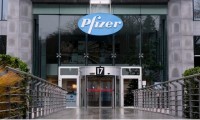-
CooperCompanies buys reproductive health products from Cook Medical after failed takeover
- Source: drugdu
- 163
- November 4, 2023
-
Pfizer Continues COVID Cliff in Q3 with First Quarterly Loss Since 2019
- Source: drugdu
- 116
- November 2, 2023
-
Shorla acquires methotrexate solution from Therakind in the US
- Source: drugdu
- 104
- November 2, 2023
-
Who is Tim Schmid, Johnson & Johnson MedTech’s new leader?
- Source: drugdu
- 144
- October 27, 2023
-
Disruptors of This Industry Are Already in It
- Source: drugdu
- 112
- October 27, 2023
-
Novo Nordisk to buy KBP’s hypertension drug ocedurenone for up to $1.3bn
- Source: drugdu
- 163
- October 19, 2023
-
Novo Nordisk Strikes Deal for Late-Stage Hypertension & Kidney Disease Drug
- Source: drugdu
- 232
- October 18, 2023
-
Almirall and EpimAb Biotherapeutics enter $210m bispecific antibody partnership
- Source: drugdu
- 134
- October 17, 2023
-
FDA Approves Pfizer’s Ulcerative Colitis Drug, $6.7B Arena Buy Pays Off
- Source: drugdu
- 108
- October 17, 2023
-
European Commission orders Illumina to divest Grail
- Source: drugdu
- 188
- October 14, 2023
your submission has already been received.
OK
Subscribe
Please enter a valid Email address!
Submit
The most relevant industry news & insight will be sent to you every two weeks.













